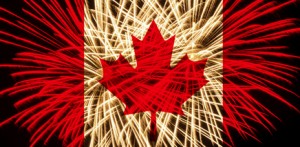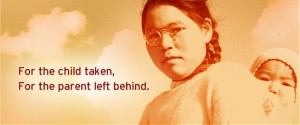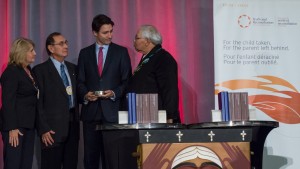Wednesday, June 29th, 2016...6:31 pm
Being Canadian
Growing up in Toronto, Canada Day was always more about the fireworks and food than it was about my country’s history; when I got a little older, it was about keeping my fingers crossed that I wouldn’t be scheduled to work, or hoping I worked a job that would follow the statutory holiday rule. Now that I’ve been out of my undergrad a handful of years, and am almost finished filling my head with Masters info, Canada Day is still about the fireworks and being thankful I don’t have to go into work that day…but it’s also become more than that.
This year, July 1st brings with it new knowledge, new awareness, and a new sense of what it means to be Canadian. At the start of my Master’s program last August, one of the program directors asked us to think about what it means for us to be Canadian (if Canadian we were), and to think about our identity in relation to the place we were now living (Toronto).
When they asked that question, I thought about my experiences working at a restaurant in downtown Toronto, where we get a lot of tourists. More often than not, these guests tell me that they find the Canadian stereotype to be true. “You really are all so friendly and nice!” they say. I smile and make what I am sure is a highly witty comment, but inside I’m thinking of our country’s complicated past, and the fact that my university stands on stolen land. I’m thinking of Spadina Ave., that was once a passage North for Indigenous peoples and is now yet another busy thoroughfare. I’m thinking of the murdered and missing Indigenous women, of the countless people living without clean water, and of the youth in Attawapiskat who feel that taking their lives is their only option for the future.
I’m thinking of the fact that in 1930s Canada, “none was too many” for Jewish people trying to escape Nazi Germany. I’m thinking of the internment camps that Canada forced all peoples of Japanese heritage into in 1941. I’m thinking of the fact that Canada paid thousands of Roma refugees money to abandon their refugee appeals.
So how did it feel for me to be Canadian? It felt complicated.
It felt like the stereotype of “polite, friendly, diverse, and welcoming” of which I had once been so proud whenever I travelled had been ripped out from under me. And for good reason. Canada’s past is a complicated one, and we’ve swept a lot of important and controversial issues under the rug, have left important apologies unspoken, and reconciliation unresolved.
That being said however, we have made headway these past few months. Trudeau’s government made good on their promise to welcome 25, 000 Syrian refugees to Canada, they’ve apologized for the Komagatu Maru incident of 1914. Trudeau further thanked the survivors of the abhorrent residential school system for their bravery in telling their stories, there’s also been a national inquiry launch into the cases of murdered and missing Indigenous women, and, closer to home, the Toronto police chief recently apologized for the 1981 bathhouse raids that targeted the LGBTQ community.
With this in mind, it seems, perhaps, that there might be some hope. I hope, for myself, that we might continue to work toward building a Canada that can finally embody and live up to the stereotype of being “polite, friendly, diverse, and welcoming”. I hope, by celebrating our differences, that we might allow ourselves to acknowledge and embrace our messy past, so that we might move toward a more unified future in which saying, “I am Canadian” means something more than hidden colonialism on the world stage.
I hope, above all, that we might resolve this Canada’s day to bow our heads to our wrongs, while raising a glass to celebrating shaping a better future. I hope that when someone asks us how we feel about being Canadian, we might be able to say “It’s complicated”, and know that that’s ok, because knowing it’s complicated means that we know we’ve got a way to go, and we’re willing to put in the work to get there.




1 Comment
July 16th, 2016 at 7:36 pm
I enjoyed reading your article…and feel very much like you do. The more I read about our history the more I realize we don’t necessarily deserve the great reputation we presently enjoy.
You hit on so many of the major low points in our history but there is one that is constantly forgotten. There has been little to no acknowledgement nor a formal apology to the Italians that were stripped of their livelihoods, taken from their families, and put into detention camps far from home during WWll. Nor for those Italians that had to report to the RCMP monthly throughout the entire war – or the 3rd or 4th generation Canadians spouses, most of British heritage, that had to report to the RCMP every month along with them; then stripped of their Canadian citizenship for the duration of the war – because they had married what was now considered an Italian ‘enemy alien’ spouse.
It bothered me to see our government formally apologize for the Komagatu Maru incident – to residents of other countries that arrived without legal papers – and yet they have yet to formally apologize for how they treated Italian Canadian citizens or those Canadians that married them. We still have a long way to go in being fair – as this rather major incident somehow got swept under the rug…unlike the Japanese interned at the same time. I don’t understand why that was…when both Japanese and Italian Canadians experienced the exact same treatment as enemy aliens.
Leave a Reply